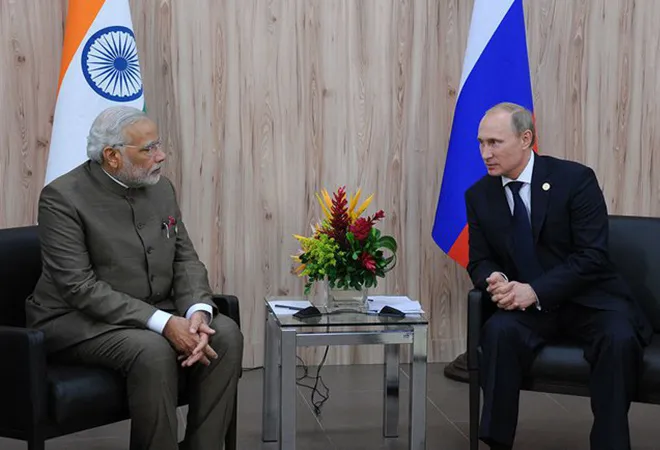The Goa summit of BRICS came to an end with a joint declaration that was as anodyne as such documents tend to be. Although India made it a point to focus on terrorism and managed to underscore "the need for close coordination on tracking sources of terrorist financing and target the hardware of terrorism, including weapons' supplies, ammunition, equipment and training", it could not convince China to change its stance on the Jaish-e-Mohammad chief, Masood Azhar. China had recently put a technical hold, once again, at the United Nations and prevented Azhar - India believes he was behind the Pathankot attack this year and the Parliament strike of 2001 - from being designated a global terrorist, despite the JeM being a UN-proscribed terror group.
Sino-Indian ties have been going downhill for the last few years, and the future of BRICS remains tentative at best because of this growing divergence. But it was the other bilateral relationship - the India-Russia one - that was the focus of the Goa summit. Where Sino-Indian bilateral engagement was perfunctory at best, the India-Russia relationship was given a big boost with New Delhi reaffirming ties with its long-standing strategic partner.
India's ties with Russia have been turbulent recently with Moscow deciding to conduct military exercises with Pakistan at a time when India was targeting Pakistan for its terror strike in Kashmir. In spite of India's apprehension over Russia conducting its first ever bilateral exercise with Pakistan, especially when Indian troops were also participating in military exercises with Russia, Moscow went ahead with its decision, raising concerns in New Delhi about the future trajectory of Russian foreign policy. Moscow, for its part, has been obsessed with challenging the United States of America and sees the growing US-India partnership as a threat. Now that America's ties with Pakistan are deteriorating, Moscow has agreed to sell Islamabad four Mi-35 attack helicopters and build a two billion dollar natural-gas pipeline there.
During the BRICS summit, India sought to re-engage Russia more substantively. Russia and India signed a multi-billion dollar deal for S-400 'Triumf' long-range air defence missile systems, an agreement on building Project 11356 frigates for the Indian navy and also agreed to set up a Russian-Indian joint venture to produce Kamov Ka-226T helicopters. India will be the second customer for the S-400 -called SA-21 Growler by Nato - after China. Russian and Indian leaders also took part in the ceremony of laying the foundation for the third and fourth power units of the Kudankulam nuclear power plant. On the energy front, the two sides announced a deal valued at around 13 billion dollars for Russian State-controlled oil giant, PAO Rosneft, and two others - the Netherlands-based commodity trader, Trafigura Group Pte, and the Russian investment fund, United Capital Partners - to take over India's Essar Oil Ltd. To allay Indian concerns, Russian officials made it clear that Moscow has not signed any contracts and has no plans of signing any military deals with Pakistan.
New Delhi has been looking largely at the West for cutting-edge technologies for an estimated 100 billion dollar upgrade of its mostly Soviet-era military equipment. There has been dissatisfaction within sections of the Indian military and policy-makers at the manner in which Moscow has handled its defence contracts in recent years. But there is also recognition of the need to have strong ties with Russia as it has been one of the few nations willing to share 'strategic technologies' with India, including aircraft carriers and nuclear submarines.
The two nation states also reiterated their common opposition to terrorism. The Indian prime minister, Narendra Modi, stated, "Russia's clear stand on the need to combat terrorism mirrors our own. We deeply appreciate Russia's understanding and support of our actions to fight cross-border terrorism that threatens our entire region. We both affirmed the need for zero tolerance in dealing with terrorists and their supporters." But Russia failed to come to India's support when it came to Pakistan-sponsored terror. China successfully persuaded Russia to keep Indian concerns on terrorism in abeyance in the declaration even though Moscow's own anxieties regarding Syria got reflected in the declaration, which called upon all parties involved in the Syrian conflict to work for a comprehensive and peaceful resolution of the conflict taking into account the legitimate aspirations of the people of Syria through inclusive national dialogue and a Syrian-led political process. Russia's kowtowing to China shouldn't be surprising, but it managed to challenge India's long-held conviction that Moscow would always come to New Delhi's aid. Russia under Vladimir Putin is determined to position itself as a major global player and is enhancing its ties with China to gain leverage in its relationship with the West. Similarly, in South Asia, Russia wants to reposition itself if only to caution India against cosying up to Washington at its expense.
During his joint press conference with the Russian president, Modi said in Russian, " Stariya droog luchhey novikh dhwukh (an old friend is better than two new ones)." This remark was aimed at Russia, which has been eyeing fresh ties with Pakistan, as well as at those who have been questioning Modi's commitment to India's old partners like Russia. India and Russia tried to re-establish "the special and privileged nature" of their strategic partnership. But the limits of the partnership were as obvious as its promise.
This commentary originally appeared in The Telegraph.
The views expressed above belong to the author(s). ORF research and analyses now available on Telegram! Click here to access our curated content — blogs, longforms and interviews.




 PREV
PREV


